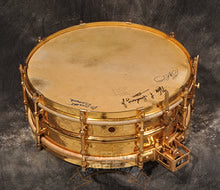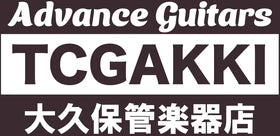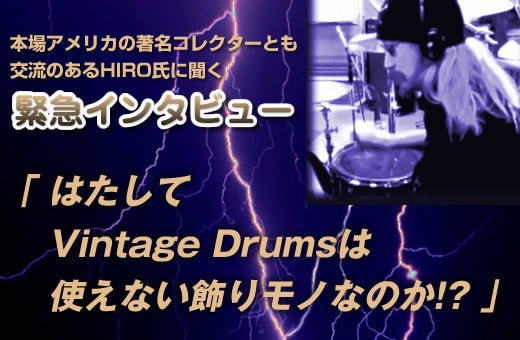

Thank you for joining us today. I would like to start with the question many people have about vintage drums: "Can vintage drums be used in today's music? I was wondering if you could talk to us about this...


Yes, you can use them. Well, depending on the year and model, there are some that are not so good. I'm not sure about this one. ..... Also, is it because this is not Japanese culture? ..... In Japan, most of the vintage drums are from the 60's and 70's. When it comes to 1920's drums like the ones we displayed at the festival the other day (*1), people have a preconceived notion that "drums this old are not usable only for their added value". I think everyone has a preconceived notion that "a drum this old is not something that can be used only for its added value.
(*1 : Drum Magazine Festival 2012)

Many people have the impression that "these drums are for decoration.


But they are mistaken! (Laughs ).
Well, the older the better, but the brass used for brass snares back then was of a completely different purity and composition from that of today, and was made of materials of such high quality that it is impossible to reproduce today. It was designed to resonate to the audience in a place like an opera house with no PA or other sound equipment, so there was no reason for it not to be loud (laughs).

Yes, that's right. I thought the sound was weak at first, but I was surprised at how loud the sound was.


The characteristic of the brass snare at that time was its grating attack and the unique sense of overtones that came with it. It was a loud sound, but it didn't hurt my ears even if I listened to it for a long time (laugh).
More than 10 years ago, someone tried to produce a reissue in the U.S. that was like a complete copy version of the Raddick brass snare of the time, but it was a failure. ..... (LOL). It is ironic, but somehow it is impossible to reproduce the old ones, even though the factory equipment is supposed to be more developed today.

It is true that vintage items are still in demand today because they cannot be reproduced. It is a wonder that the sound is different, even though they are reproduced and built the same way. It's a mystery (laughs).


Also, the same goes for wood drums. To take one example, usually when people hear mahogany wood, they say something like, "Oh, it doesn't have volume, but it has a nice soft sound. .....
However, the mahogany of those days was Honduran mahogany, which was used in many guitars such as Gibson Les Paul in the 50's and prewar guitars. At that time, the rigidity of the wood itself was totally different from modern mahogany, and since the time has passed, the rigidity of the shell is even stronger.
Try tapping the shell of a wood snare from the 20's or so with your finger. Just by listening to the sound, you will immediately know if it is a good one or not, without even trying it on. !!!!!
The value of the vintage is confirmed by ○○○○○○○○○! !

I'm sure you have seen a lot of vintage drums, and I'd like to ask you about the advantages and disadvantages of vintage drums based on your experience.


As I mentioned earlier, the advantage of vintage drums is that they can produce a high quality and unique sound that cannot be produced by current drums. Also, of course, it has a unique look, so it can catch people's attention, right? Huh?
What are those drums? I can get people's attention like, "What's that drummer doing?
Other than that, the advantage is that ordinary current or recent used ones will be treated as just used over time, so their value will only decrease. ..... (laughter). But as for vintage items, if they are still in usable condition after 80 or 100 years, their value as vintage items will not decrease. Well, of course, the market price fluctuates with changes in the economy (laughs), but it never becomes like a freebie.

I see. Certainly, when you think about 80 or 100 years of time, you can say that it is a cultural heritage of the United States.
It's amazing to have that at hand and to be able to make sounds with it! Even 80 or 100 years ago, someone was standing in front of a drum and lifting a stick, right? It's amazing !!!


Now, that's a disadvantage (laughs). Hmmm ..... What do you think? Well, if a part breaks on a particular model, you may not be able to get the part immediately, and some parts may be difficult to obtain. ..... However, if you buy from a reliable store that has expertise in this area, I am sure they will take care of the parts supply.
In the U.S., vintage drums are a part of the culture, and there are quite a few companies that make replacement parts, so even if you need to replace a part, it's easy to fix it without losing the vintage look.

I see! So replacement parts exist because their value as vintage parts is well established. The existence of replacement parts proves the established value.
When stock runs out, we will make replacements.♪When stock runs out, we will make more and replenish it........"

By the way, I heard that you visited vintage drum stores and met famous collectors when you came to the U.S. Can you tell us about your memorable episodes and your view of vintage drums in the U.S.?


I'm the type of person who moves as I please (laughs), so when I have an idea, I act on it immediately !!!!! Even if I was staying in New York City, if I heard that there was a good deal in the next state or the next state over, I would take a long-distance bus the next morning. I'd drive to Memphis the next day if I heard that Black Beauty was for sale. ..... (Laughs). After many years of repeating such trips, I became a million-miler for a certain airline (laugh).

That's a lot (laughs).


But I visited many places, had opportunities to meet many people, and learned ..... and in the process of doing so, you came into contact with prominent collectors and famous musicians from abroad. Well, of course, I think that the wealth of knowledge I gained about vintage drums was a great benefit to me, but what was more important to me, and still is important, is the connections between people: ..... In other words, encounters through musical instruments. In Japan, of course, there are many people who have respect for musical instruments, but in the U.S., where they originate, they are much more like a part of the culture.
That is why it is passed down from generation to generation.

I see. You are proud of your own culture. We are also fascinated by it, but you have a deeper respect for it as part of your culture.


Thank you for your answers today. Last question, Hiro, I know that you have owned many vintage drums in the past, and I would like to know how to handle vintage drums. I would like to know your advice from your experience...

Hmmm... ..... This is the most difficult question. Whenever I have an idea, I just buy it: !!!!! I guess (laugh).

Oh~ (laughs).


Well, this sounds like a joke, but seriously speaking, vintage instruments cannot be replenished when they run out of stock like current products. And there are individual differences, so in a sense, you can't just find a vintage instrument that you think, "This is the one. If you find a vintage drum that you think "this is the one", you should buy it without hesitation (laugh). So ..... Even if you have to go through the trouble, ..... (laugh).
But I think that the instruments that you buy because you really want to have them, even if you have to force yourself to buy them, you will take good care of them and you will never get tired of using them as your life's work. And as for how you should handle it, ..... No, ..... I think it's fine to be normal.
I think you should use it with respect and love for the instrument.

I see. Respect and love for the instrument is important, isn't it?
Thank you very much for all the rare stories you shared with us today!
HIRO
(Drummer, Producer, Recording Engineer)

After playing in the indie band CROWLEY, he made his major debut as the drummer of THE STAR CLUB in 1986, and joined Kuroyume in 1993.
He has participated in many recording and live shows as a drummer and sound producer mainly for rock bands, making use of his extensive knowledge of drum sound production. He also has a deep knowledge of Vintage Drums, and is known as a specialist of Vintage Drums, having contributed feature articles to "Rhythm & Drum Magazine" in the 90's.
Since the late 1990s, he has worked as a producer and engineer in Japan and the United States. At the same time, he resumed his activities as a drummer, and is currently active as a support drummer in Japan and abroad. In July of this year, under the name THE STAR CLUB 1990, the band performed a one-night-only reunion show at 0-West in Tokyo with the members from 1990, and the limited press DVD of the show, which was recorded to a packed house, was sold out upon advance reservation.

